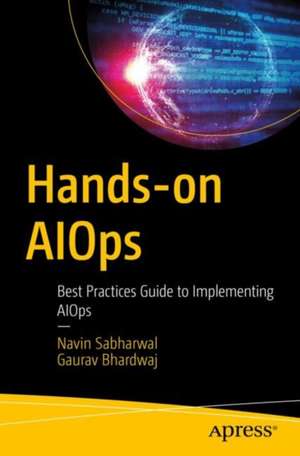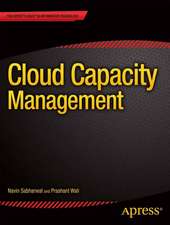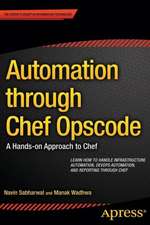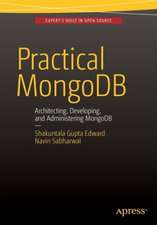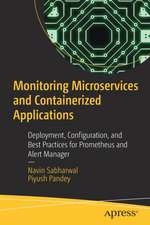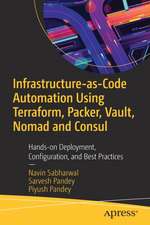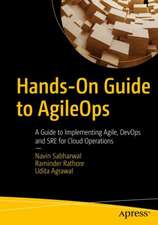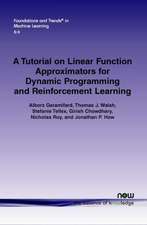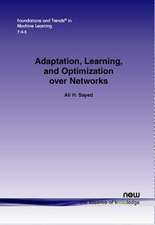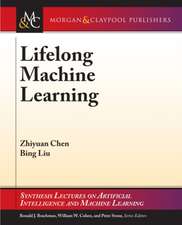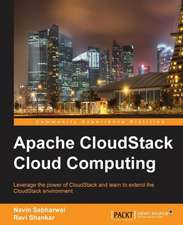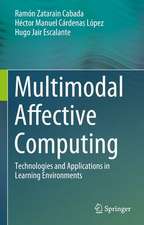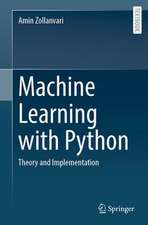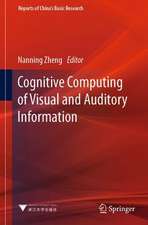Hands-on AIOps: Best Practices Guide to Implementing AIOps
Autor Navin Sabharwal, Gaurav Bhardwajen Limba Engleză Paperback – 21 iul 2022
Welcome to your hands-on guide to artificial intelligence for IT operations (AIOps). This book provides in-depth coverage, including operations and technical aspects. The fundamentals of machine learning (ML) and artificial intelligence (AI) that form the core of AIOps are explained as well as the implementation of multiple AIOps uses cases using ML algorithms.
The book begins with an overview of AIOps, covering its relevance and benefits in the current IT operations landscape. The authors discuss the evolution of AIOps, its architecture, technologies, AIOps challenges, and various practical use cases to efficiently implement AIOps and continuously improve it. The book provides detailed guidance on the role of AIOps in site reliability engineering (SRE) and DevOps models and explains how AIOps enables key SRE principles.
The book provides ready-to-use best practices for implementing AIOps in an enterprise. Each component of AIOps and ML using Python code andtemplates is explained and shows how ML can be used to deliver AIOps use cases for IT operations.
What You Will Learn
AIOps enthusiasts, monitoring and management consultants, observability engineers, site reliability engineers, infrastructure architects, cloud monitoring consultants, service management experts, DevOps architects, DevOps engineers, and DevSecOps experts
The book begins with an overview of AIOps, covering its relevance and benefits in the current IT operations landscape. The authors discuss the evolution of AIOps, its architecture, technologies, AIOps challenges, and various practical use cases to efficiently implement AIOps and continuously improve it. The book provides detailed guidance on the role of AIOps in site reliability engineering (SRE) and DevOps models and explains how AIOps enables key SRE principles.
The book provides ready-to-use best practices for implementing AIOps in an enterprise. Each component of AIOps and ML using Python code andtemplates is explained and shows how ML can be used to deliver AIOps use cases for IT operations.
What You Will Learn
- Know what AIOps is and the technologies involved
- Understand AIOps relevance through use cases
- Understand AIOps enablement in SRE and DevOps
- Understand AI and ML technologies and algorithms
- Use algorithms to implement AIOps use cases
- Use best practices and processes to set up AIOps practices in an enterprise
- Know the fundamentals of ML and deep learning
- Study a hands-on use case on de-duplication in AIOps
- Use regression techniques for automated baselining
- Use anomaly detection techniques in AIOps
AIOps enthusiasts, monitoring and management consultants, observability engineers, site reliability engineers, infrastructure architects, cloud monitoring consultants, service management experts, DevOps architects, DevOps engineers, and DevSecOps experts
Preț: 213.40 lei
Preț vechi: 266.75 lei
-20% Nou
Puncte Express: 320
Preț estimativ în valută:
40.85€ • 44.38$ • 34.33£
40.85€ • 44.38$ • 34.33£
Carte disponibilă
Livrare economică 31 martie-14 aprilie
Preluare comenzi: 021 569.72.76
Specificații
ISBN-13: 9781484282663
ISBN-10: 1484282663
Pagini: 243
Ilustrații: XXIII, 243 p. 97 illus.
Dimensiuni: 155 x 235 mm
Greutate: 0.38 kg
Ediția:1st ed.
Editura: Apress
Colecția Apress
Locul publicării:Berkeley, CA, United States
ISBN-10: 1484282663
Pagini: 243
Ilustrații: XXIII, 243 p. 97 illus.
Dimensiuni: 155 x 235 mm
Greutate: 0.38 kg
Ediția:1st ed.
Editura: Apress
Colecția Apress
Locul publicării:Berkeley, CA, United States
Cuprins
Chapter 1: What Is Artificial Intelligence for IT Operations (AIOps): Needs and Benefits.- Chapter 2: AIOps Architecture, Methodology.- Chapter 3: AIOps Challenges.- Chapter 4: AIOps Supporting SRE and DevOps.- Chapter 5: Fundamentals of Machine Learning and AI.- Chapter 6: AIOps Use Case - De-duplication.- Chapter 7: AIOps Use Case - Automated Baselining.- Chapter 8: AIOps Use Case - Anomaly Detection.- Chapter 9: Setting Up AIOps.
Notă biografică
Navin Sabharwal is currently Chief Architect and Head of Strategy for Autonomics, named "DRYiCE" at HCL technologies. He is responsible for innovation, presales, and delivery of award-winning autonomics platforms for HCL technologies. Navin is an innovator, thought leader, author, and a consultant in areas of AI and machine learning (ML), observability, AIOps, DevOps, DevSecOps, engineering, and R&D. He is responsible for IP development & service delivery in the areas of AI and ML, automation products, cloud computing, public cloud AWS, Microsoft Azure, VMWare private cloud, Microsoft private cloud, data center automation, analytics for IT operations, and IT service management.
Gaurav Bhardwaj is a seasoned IT professional and technology evangelist with expertise in service assurance, cloud computing, AI/ML-based software product development, engineering, and data analytics. He has international experience in developing and executing IT automation strategies and solutions that are aligned with business goals as well as heading multi-million USD services globally. Gaurav has a proven track record of achievements in roles of enterprise architect and consultant for large and complex global engagements (includes multiple Fortune 500 companies) leveraging automation as the pivot for business development as well as for transforming legacy environments/platforms into next-generation IT environments powered by cloud-native and containerized apps, SDI, and AIOps and DevOps methodologies.
Textul de pe ultima copertă
Welcome to your hands-on guide to artificial intelligence for IT operations (AIOps). This book provides in-depth coverage, including operations and technical aspects. The fundamentals of machine learning (ML) and artificial intelligence (AI) that form the core of AIOps are explained as well as the implementation of multiple AIOps uses cases using ML algorithms.
The book begins with an overview of AIOps, covering its relevance and benefits in the current IT operations landscape. The authors discuss the evolution of AIOps, its architecture, technologies, AIOps challenges, and various practical use cases to efficiently implement AIOps and continuously improve it. The book provides detailed guidance on the role of AIOps in site reliability engineering (SRE) and DevOps models and explains how AIOps enables key SRE principles.
The book provides ready-to-use best practices for implementing AIOps in an enterprise. Each component of AIOps and ML using Python code and templates isexplained and shows how ML can be used to deliver AIOps use cases for IT operations.
What You Will Learn
The book begins with an overview of AIOps, covering its relevance and benefits in the current IT operations landscape. The authors discuss the evolution of AIOps, its architecture, technologies, AIOps challenges, and various practical use cases to efficiently implement AIOps and continuously improve it. The book provides detailed guidance on the role of AIOps in site reliability engineering (SRE) and DevOps models and explains how AIOps enables key SRE principles.
The book provides ready-to-use best practices for implementing AIOps in an enterprise. Each component of AIOps and ML using Python code and templates isexplained and shows how ML can be used to deliver AIOps use cases for IT operations.
What You Will Learn
- Know what AIOps is and the technologies involved
- Understand AIOps relevance through use cases
- Understand AIOps enablement in SRE and DevOps
- Understand AI and ML technologies and algorithms
- Use algorithms to implement AIOps use cases
- Use best practices and processes to set up AIOps practices in an enterprise
- Know the fundamentals of ML and deep learning
- Study a hands-on use case on de-duplication in AIOps
- Use regression techniques for automated baselining
- Use anomaly detection techniques in AIOps
Caracteristici
Gives step-by-step guidance to implement AIOps practices and processes in any enterprise Covers multiple examples that organizations face during implementation and how to resolve them Explains templates, metrics, and guidance that can be readily adopted as best practices
